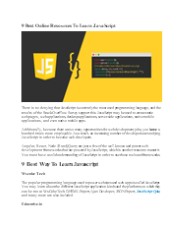Novice and Expert Programmers - PowerPoint PPT Presentation
1 / 11
Title:
Novice and Expert Programmers
Description:
novices could understand the syntax and semantics of individual statements ... Results of the Studies: Novices ... Should tools for novices: Have less or more ... – PowerPoint PPT presentation
Number of Views:29
Avg rating:3.0/5.0
Title: Novice and Expert Programmers
1
Novice and Expert Programmers
- Gild Project
- University of Victoria
- Jeff Michaud
2
Overview of Presentation
- General Definitions
- Psychological Studies
- Novices
- Expert
- Common
- Novice-Expert Continuum
- Discussion
3
General Definitions
- Expert someone who is more than just proficient
in an area - Novice someone who is just entering an area
4
In the beginning
- Psychological studies of programmers started in
the 1970s - Results are unfortunately not reliable
- Weak methodologies
- Complex programming practices
- No psychologists
5
Enter the Psychologists
- Proper research methodologies used
- Studies start to show consistent results
- novices could understand the syntax and semantics
of individual statements - but could not combine the statements into
programs to solve the problem
6
Results of the Studies Novices
- lack an adequate mental model of the area
Kessler and Anderson, 1989 - are limited to a surface knowledge of subject,
have fragile knowledge (something the student
knows but fails to use when necessary) and
neglect strategies Perkins and Martin, 1986 - use general problem solving strategies (i.e.,
copy a similar solution or work backwards from
the goal to determine the solution) rather than
strategies dependent on the particular problem - tend to approach programming through control
structures - use a line-by-line, bottom up approach to problem
solution Anderson, 1985
7
Results of the studies Experts
- have many mental models and choose and mix them
in an opportunistic way Visser and Hoc, 1990 - have a deep knowledge of their subject which is
hierarchical and many layered with explicit maps
between layers - apply everything they know
- when given a task in a familiar area, work
forward from the givens and develop sub-goals in
a hierarchical manner, but given an unfamiliar
problem, fall back on general problem solving
techniques - have a better way of recognizing problems that
require a similar solution Chi, et al, 1981
Davies, 1990 - tend to approach a program through its data
structures or objects Petre and Winder, 1988 - use algorithms rather than a specific syntax
(they abstract from a particular language to the
general concept) - are faster and more accurate Wieden-beck, 1986
Allwood, 1986 - have better syntactical and semantical knowledge
and better tactical and strategic skills
Bateson, Alexander Murphy, 1987
8
Regardless of expertise
- Given a new, unfamiliar language, the syntax is
not the problem, learning how to use and combine
the statements to achieve the desired effect is
difficult. - Learning the concepts and techniques of a new
language requires writing programs in that
language. Studying the syntax and semantics is
not sufficient to understand and properly apply
the new language. - Problem solution by analogy is common at all
levels choosing the proper analogy may be
difficult. - At all levels, people progress to the next level
by solving problems. The old saying that practice
makes perfect has solid psychological basis.
9
The Continuum
- Dreyfus and Dreyfus Dreyfus, 1985 described the
continuum from novice to expert with five stages - Novice
- Learns objective facts and features and rules for
determining actions based upon these facts and
features. (Everything they do is context free.) - Advanced Beginner
- Starts to recognize and handle situations not
covered by given facts, features and rules
(context sensitive) without quite understanding
what he/she is doing. - Competence
- After considering the whole situation,
consciously chooses an organized plan for
achieving the goal. - Proficiency
- No longer has to consciously reason through all
the steps to determine a plan. - Expert
- "An expert generally knows what to do based upon
mature and practiced understanding."
10
Discussion
- Many tools for intro programmers are marketed as
a scaled down version of experts tools. - Should tools for novices
- Have less or more functionality than those for
experts? - Have different functionality than those for
experts.
11
Problem Solving and Pedagogy
- Problem Solving
- Understand the problem
- Determine how to solve the problem
- Translate the solution into a computer program
- Test and Debug
- Pedagogy
- Learn the syntax and semantics of one feature at
a time - Learn to combine this language feature with known
design skills to develop programs to solve the
problem - Develop general problem solving skills































